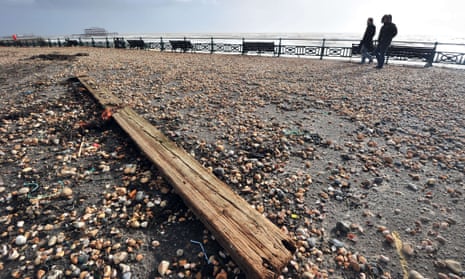I don’t usually expect to be picking my way through seaweed, pebbles and assorted debris from the sea when I stroll along the promenade in Brighton, but after the recent storms this is what I found as beach and pavement merged into one.
Walking along the seafront is one of the pleasures of living in Brighton, the commute to London is not. Both were disrupted in the storms, although nothing like the misery caused to people on the Somerset Levels and fellow commuters using the main rail link between Devon and Cornwall. All along the south coast thousands of seabirds were washed up dead on the shoreline.
We know that these extreme weather events are in line with scientists’ predictions of the impacts of climate change. Now these impacts are being felt on our own doorstep, affecting the everyday things we love and depend on – our homes, our public transport, our coastlines.
For a long time organisations concerned about climate change have used the large and looming long-term threats to gain attention on this issue. It has created a good movement for change, but any relevant campaign must move with the times.
In 2005 more than 100 faith, environment, development and trade union groups came together in an unprecedented partnership to make a stand on climate, and Stop Climate Chaos was born. Four years later we held The Wave, the biggest climate march this country has ever seen.
But fast forward five years and the world has turned, we have had one of the most serious economic crises in history with huge impacts on people all around the world. The rush to pull ourselves back into growth has meant the concerns of the poorest people and the planet have not been top priority. Meanwhile the experts have learnt more about how our land and seas are responding to climate changes and the scientific consensus has strengthened.
We knew that people were concerned about climate change and cared about the things which are all around us but that wasn’t being translated into a strong voice within our society; so we realised we needed to talk to people about why. Some surprising things emerged. Many of the people we need to reach – those who care but haven’t turned that concern into action – are turned off by doom and gloom messages about ice caps and apocalypse.
They understand the problem, but aren’t motivated to act. So we tried some different approaches, and the one that really resonated was talking to people about the things they love and cherish and which are threatened by climate change.
There are so many things close to home that we take for granted that have an uncertain future because of the changing climate. The most important, of course, is our children. But we have been hearing stories about communities in the world’s poorest countries suffering, bees and butterflies whose habitats are being lost, and even chocolate prices soaring due to loss of plantation land in West Africa.
These, and many more, stories will be told through our campaign and captured on our website.
The strength of this partnership is in its extraordinary depth and breadth. When else would we see the Women’s Institute, Oxfam and Cafod standing shoulder to shoulder with the RSPB, WWF and Unison on one issue? So we have changed the name to celebrate this – we will now be known as The Climate Coalition.
We have got big plans from online campaigns and lobbying opportunities to large scale events and public engagement aimed at recapturing the political and media spotlight.
We know that we need to change tack if we are to keep up the momentum needed to wean us off fossil fuels. As politics and society has changed, our message has also evolved. We will not be sidelined, ignored, placated or put in a convenient political box – the things we love are just too important.

Comments (…)
Sign in or create your Guardian account to join the discussion